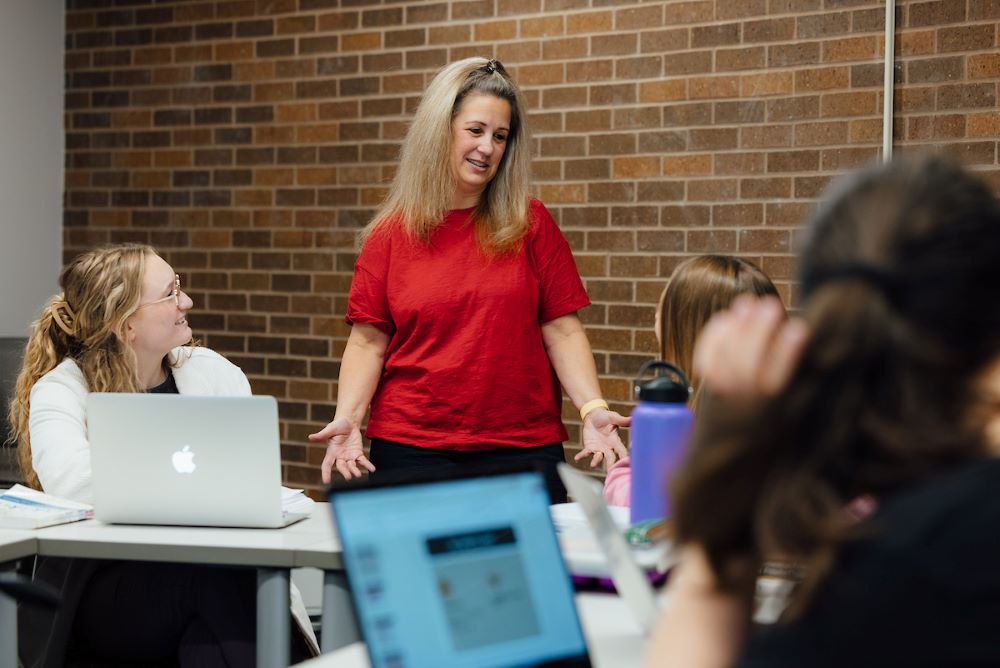Stephanie Schmitz

Stephanie Schmitz
Briefly describe your educational background.
I received my BS in child development in 1994 from Iowa State University, both my MAE and EdS in school psychology from UNI and my PhD in school psychology from the University of Nebraska-Lincoln in 2011.
Briefly describe your career background.
After receiving my EdS in 1997, I worked for 10 years as a school psychologist in Green Hills Area Education Agency, within several small, rural districts, and for six years within the Council Bluffs community school district. I worked primarily with elementary children and within early childhood, birth to five years. After receiving my PhD in 2011, I started as an assistant professor in the School Psychology Program at UNI.
Why did you choose this career path?
I love working with children. When I started at Iowa State, I had planned to pursue a degree in elementary education. However, I learned that PreK-6 teaching was not the best fit for me. I had not heard of school psychology until my junior year at Iowa State and was then fortunate to work on some research with a faculty member with a background in school psychology. That experience led me to a career in school psychology!
What brought you to UNI?
My primary reason for returning to school, pursuing my PhD in 2006, was to pursue a faculty position within a school psychology program. While I had quite a bit of clinical training as part of my PhD program, my goal of working in higher education, training future school psychologists, did not change. During my internship year, two positions within the school psychology program at UNI opened up. Being familiar with the program, UNI and Cedar Falls, I was quick to apply. As both my husband and I also have family in the Midwest, staying within this region was also important.
What's your favorite part about UNI?
I have always appreciated the collaboration across departments and colleges, from the time I was a student to now as a faculty member. Having the opportunity to meet and work with others is fantastic. I have met so many wonderful people, all dedicated to student success, and have had the chance to collaborate on such things as presentations, publications, courses, clinical work and administrative duties. Through such collaboration, I have had some amazing, meaningful experiences!
What is your greatest professional accomplishment?
While there have been many meaningful accomplishments, I think at least one of my greatest would be the feedback and awards I have received for my teaching since coming to UNI. My passion is working with students, both in the schools and in higher education. So, feedback on the positive impact I have had on not only their learning, but also their excitement and passion for working with students, has been so meaningful.
What is your area(s) of research interest?
As my background is in early childhood, I have had a focus on this age group, even prior to coming to UNI. I have done some research in early literacy, early childhood mental health, early childhood assessment and intervention and mindfulness. I have also collaborated with others on school-based mental health, parent involvement in special education, and areas specific to school psychology training (e.g., field experiences, dispositions). Several colleagues and I were excited to develop a themed issue on School-Based Mental Health Services for Students with Disabilities for the Teaching Exceptional Children journal.
What does being student-focused mean to you?
Students are the reason we are at UNI and do what we do. As I see myself as a clinician who is training students to become future colleagues, having a focus on student success is imperative!
We talk about helping students realize or even exceed their expectations and potential. What does it mean to you to be part of that process and see the outcome?
It is a wonderful opportunity to play a role, even a very small one, in student success. Seeing our students do well in their coursework and watching them develop a passion for becoming an educator has been fantastic.
What do you hope students learn from you?
My hope is that students not only gain knowledge, develop an understanding of course content and have opportunities to learn how to apply their knowledge in working with students, educators and families; but also that they develop (or expand upon) a passion for working with students and helping them to succeed in the classroom, school, community and beyond. In fact, this is something I talk with my students about. There is a large amount of responsibility in becoming an educator and it is important for students to keep this in the forefront of their mind as they move through their coursework and field experiences.
What advice do you have for prospective/current students to make the most of their time at UNI?
Find your passion. It may be that what you decided to pursue when starting at UNI is what you stick with throughout your time here; but, you may also find an area/career that you didn't know about or consider before. Always keep your mind open to possibilities!
